We have come across this post pertaining to Is Your Water Heater Leaking? below on the web and concluded it made perfect sense to share it with you in this article.

A water heater is one of one of the most important basic devices that can be discovered in a house. With hot water heater, you don't need to experience the tension of home heating water manually whenever there is a demand to take a bath, wash, or the meals. There is constantly an opportunity that your water heater would certainly act up as with the majority of mechanical gadgets.
It is very important to note any little malfunction and tackle it promptly prior to points get out of hand. Most times, your hot water heater begins to malfunction when there is a build-up of debris as a result of constant usage. As a precaution, periodic flushing of your water heater is suggested to avoid sediment build-up as well as prevent practical failure.
Common hot water heater emergency situations as well as just how to handle them
Too little warm water
It might be that the water heating system can't sustain the warm water demand for your home. You might update your water heater to one with a bigger capacity.
Rising and fall water temperature level.
Your water heater might begin generating water of various temperatures normally ice scalding or cold hot. In this situation, the first thing you do is to guarantee that the temperature is readied to the preferred level. If after doing this, the water temperature level keeps changing throughout showers or other activities, you may have a damaged thermostat. There could be a requirement to replace either the thermostat or the heating device of your hot water heater.
Dripping hot water heater container.
A dripping tank could be a sign of deterioration. It can trigger damages to the floor, wall surface and electric gadgets around it. You could even go to risk of having your house flooded. In this scenario, you ought to switch off your hot water heater, permit it to cool down, and thoroughly look for the source of the trouble. Sometimes, all you need to do is to tighten up a few screws or pipe links in cases of minor leaks. Yet if this does not function as well as the leak persists, you may need to use the services of a professional for a suitable substitute.
Blemished or odiferous water
You require to know if the concern is from the water or the storage tank source when this takes place. You are specific that it is your water heating unit that is damaged if there is no funny scent when you run cold water. The odiferous water can be triggered by rust or the build-up of germs or debris in the hot water heater storage tank. Once you see this, you can try flushing out your storage tank or changing the anode if the trouble lingers. The function of the anode is to clean out microorganisms from your tank. Because the anode pole substitute needs a thorough understanding of your water heater, you will certainly need the assistance of an expert.
Conclusion
Some home owners neglect little caution and minor faults in their hot water heater system. This only results in additional damage and a possible total break down of your device. You should handle your water heater faults as quickly as they come up to prevent even more expenses as well as unneeded emergency difficulties.
With water heating systems, you don't need to go with the stress of heating water manually every time there is a need to take a bath, do the laundry, or the dishes. It may be that the water heating unit can't sustain the warm water need for your apartment. Your water heater might start producing water of different temperature levels generally ice cool or hot warm. If there is no amusing smell when you run cold water, then you are certain that it is your water heating system that is malfunctioning. The odiferous water can be triggered by rust or the buildup of bacteria or debris in the water heating unit container.
Water Heater Burst: Why This Happens And What To Do Next
Water Heater Explosion Warning Signs
Since storage water heaters are made of metal and store large volumes of heated water, they carry an increased risk of leaking or even exploding as they begin to rust at the fittings and seams over time. If the thermostat controlling the water temperature within the tank is faulty, or if mineral buildup inside the water heater prevents the thermostat from sensing the water’s temperature correctly, the water could become overheated. This will expand its volume within the tank, causing it to press at the tank’s fittings and seams. If these fittings and seams are rusted or corroded, the pressure could result in a leak or even an explosion.
Here are some risk factors and warning signs of an increased risk of water heater leak or explosion:
Your water heater is more than 10 years old. Your water heater makes clanking, banging or rumbling noises as it heats up, indicating that sediment has built up and hardened inside the tank. There is visible rust on the outside of the water heater, especially located at the pipe fittings or the seams that run down the tank. There is rusty water coming from your water heater, indicating that there may be rust building up inside. Your water heater is leaking, which could indicate either a crack somewhere in the tank or a malfunctioning temperature-and-pressure (T&P) relief valve. What To Do When Water Heater Leaks
If you find water dripping or seeping out of your water heater, or pooling around it, it means your water heater is leaking. If you find a leak, it may be best to call a plumbing professional to diagnose the problem and determine how best to handle it. If you choose to tackle it on your own, there are a few things you can do.
TURN OFF THE POWER
Next, shut off the power to the hot water tank at your home’s electrical breaker box. If you don’t shut off the power, the heating elements within the tank could continue to stay hot, which could pose a fire risk.
If you have a gas-powered water heater, you’ll also need to shut off the gas line leading into the tank.
FIND THE LEAK
Now it’s time to determine where the leak is coming from. Likely locations are the T&P valve, the drain valve or one of the pipes or fittings that feed into the top of the tank. If you see any rust or corrosion on the outside of your water heater’s tank, pipes or fittings, these could also be the source of the leak.
REPAIR THE LEAK
Once you determine the source of your water heater leak, you’ll have a better idea of what steps you need to take to fix the problem. It may be a simple fix—such as using a wrench to tighten fittings or replacing the T&P valve—but it may be something more complicated. You may even need to drain the tank, remove the water heater and install a new one.
https://www.abchomeandcommercial.com/blog/water-heater-burst/

As a fervent reader on Common Hot Water Heater Problems, I imagined sharing that article was worth the trouble. Are you aware of another individual who is serious about the niche? Take a moment to promote it. I cherish reading our article about The Importance of Water Heater Maintenance.
Call, we respond!